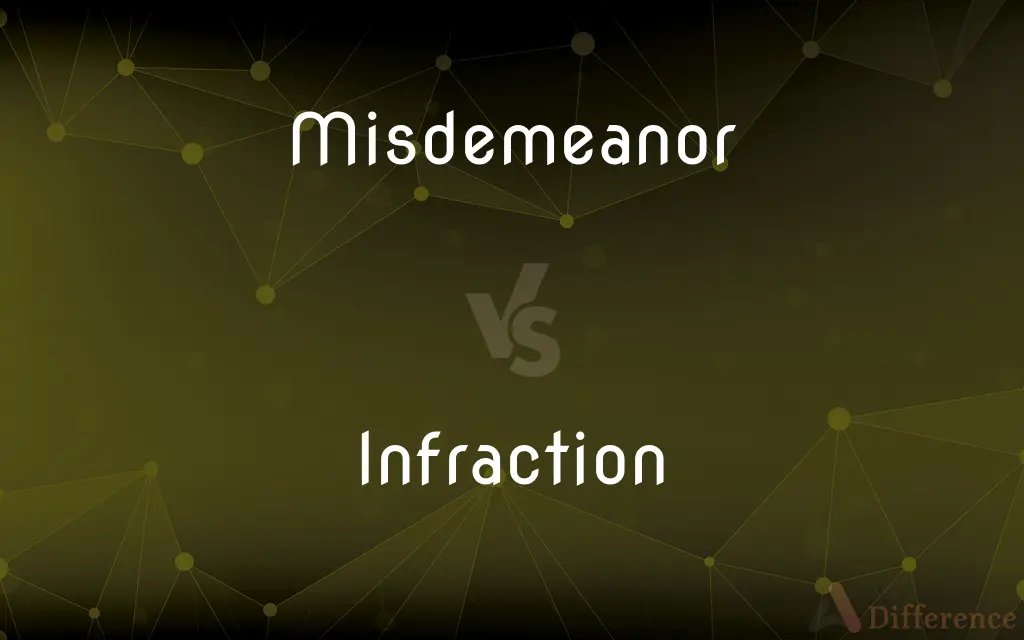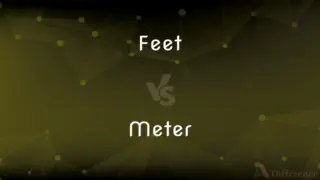Misdemeanor vs. Infraction — What's the Difference?
By Maham Liaqat & Urooj Arif — Updated on April 29, 2024
Misdemeanors are more serious criminal offenses than infractions, often punishable by jail time and fines, while infractions are minor violations, typically resulting in fines only.

Difference Between Misdemeanor and Infraction
Table of Contents
ADVERTISEMENT
Key Differences
A misdemeanor is a criminal offense that is more serious than an infraction and can lead to jail time and substantial fines. On the other hand, infractions are the least severe type of offense and usually result in only a fine or a warning.
Misdemeanors often require a court appearance, and a conviction can remain on a person’s criminal record, potentially affecting future opportunities. Infractions, however, typically do not require a court appearance if the fine is paid, and they do not usually appear on a criminal record.
The legal processes involved in misdemeanors are more formal and can include the right to a trial and legal representation. Whereas, infractions often involve a simplified process, such as paying a ticket, without the need for a formal court trial.
Misdemeanors can include crimes such as petty theft, simple assault, and first-time DUI. In contrast, infractions are generally non-criminal violations, such as traffic offenses or minor municipal code violations.
The consequences of a misdemeanor conviction can be long-lasting and more severe, including potential jail time, loss of professional licenses, or immigration consequences. Infractions rarely have consequences beyond the immediate financial penalty.
ADVERTISEMENT
Comparison Chart
Severity
More serious, criminal in nature
Less serious, often non-criminal
Legal Consequences
Jail time possible, higher fines
Typically only a fine
Court Appearance
Often required
Not required if fine is paid
Record Impact
Can appear on criminal records
Usually does not appear on criminal records
Examples
Petty theft, simple assault, first-time DUI
Traffic violations, littering
Compare with Definitions
Misdemeanor
Subject to legal penalties including fines and jail time.
John served a 30-day jail sentence for his misdemeanor.
Infraction
Often resolved without a formal court trial.
Lisa resolved her infraction by paying the ticket online.
Misdemeanor
Can affect one's professional licenses.
His misdemeanor conviction led to the suspension of his medical license.
Infraction
Includes minor municipal or local ordinance violations.
An infraction was issued for violating the city’s noise ordinance.
Misdemeanor
Requires legal representation in court.
She hired a lawyer to defend her misdemeanor charge.
Infraction
Usually punishable by a fine without jail time.
He paid a $100 fine for his traffic infraction.
Misdemeanor
A criminal offense less severe than a felony.
Jane was charged with a misdemeanor after shoplifting.
Infraction
Does not appear on a permanent criminal record.
His speeding infraction did not show up on his background check.
Misdemeanor
May have immigration consequences.
Her misdemeanor offense complicated her visa renewal process.
Infraction
A minor violation or breach of law.
Getting a parking ticket is considered an infraction.
Misdemeanor
A misdemeanor (American English, spelled misdemeanour in British English) is any "lesser" criminal act in some common law legal systems. Misdemeanors are generally punished less severely than more serious felonies, but theoretically more so than administrative infractions (also known as minor, petty, or summary offences) and regulatory offences.
Infraction
The act or an instance of infringing, as of a law or rule; a violation.
Misdemeanor
A misdeed.
Infraction
(legal) A minor offence, petty crime.
Even stealing a pack of gum is an infraction in the eyes of the law.
Misdemeanor
(Law) A criminal offense that is less serious than a felony and generally punishable by a fine, a jail term of up to a year, or both.
Infraction
A violation; breach.
Misdemeanor
(legal) A crime usually punishable upon conviction by a small fine or by a short term of imprisonment. In the USA, misdemeanants usually are incarcerated in county jail for less than one year, but felons usually are incarcerated in state or federal prison for more than one year. Crimes which are punishable by large fines or by longer imprisonment are sometimes called felonies.
Infraction
(ice hockey) A major violation of rules which leads to a penalty, if detected by the referee.
Misdemeanor
Any act of misbehavior.
Infraction
The act of infracting or breaking; breach; violation; nonobservance; infringement; as, an infraction of a treaty, compact, rule, or law.
Misdemeanor
Ill behavior; evil conduct; fault.
Infraction
A crime less serious than a felony
Misdemeanor
A crime less than a felony.
Misdemeanor
A crime less serious than a felony
Common Curiosities
What is a misdemeanor?
A misdemeanor is a criminal offense that is more severe than an infraction but less severe than a felony, often punishable by fines and possibly jail time.
What constitutes an infraction?
An infraction is a minor violation, typically punishable by a fine and not involving jail time or a criminal record.
Can a misdemeanor lead to jail time?
Yes, misdemeanors can lead to jail time, depending on the severity of the offense and jurisdictional laws.
What are common examples of infractions?
Common infractions include traffic violations, such as speeding or running a stop sign, and minor municipal code violations.
Are infractions considered criminal offenses?
No, infractions are not typically considered criminal offenses and are often handled outside of criminal courts.
Do I need a lawyer for a misdemeanor charge?
It is advisable to have legal representation for a misdemeanor charge due to the potential consequences, including jail time.
What happens if I just pay the fine for an infraction?
Paying the fine for an infraction usually resolves the matter completely, without further legal consequences.
What are common examples of misdemeanors?
Common misdemeanors include petty theft, simple assault, and first-time DUI offenses.
How does a misdemeanor affect my criminal record?
A misdemeanor conviction will generally appear on your criminal record, which can affect employment, licensing, and other areas of life.
Do infractions appear on background checks?
Typically, infractions do not appear on standard criminal background checks.
Share Your Discovery

Previous Comparison
Takeout vs. Takeaway
Next Comparison
Feet vs. MeterAuthor Spotlight
Written by
Maham LiaqatCo-written by
Urooj ArifUrooj is a skilled content writer at Ask Difference, known for her exceptional ability to simplify complex topics into engaging and informative content. With a passion for research and a flair for clear, concise writing, she consistently delivers articles that resonate with our diverse audience.
















































